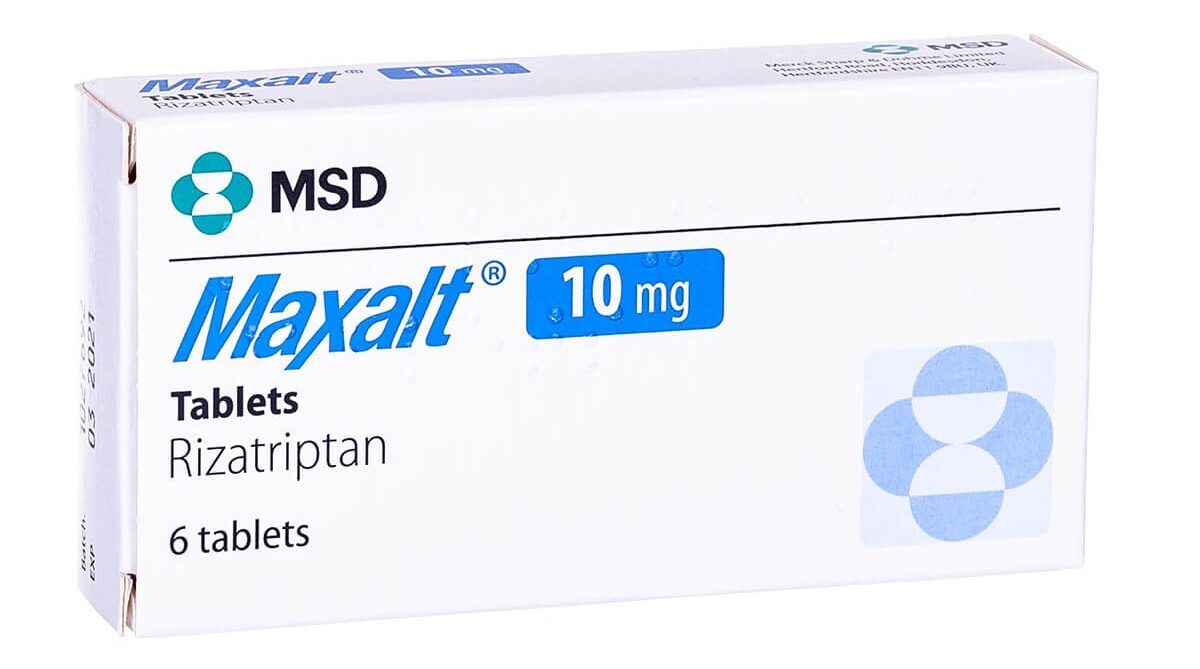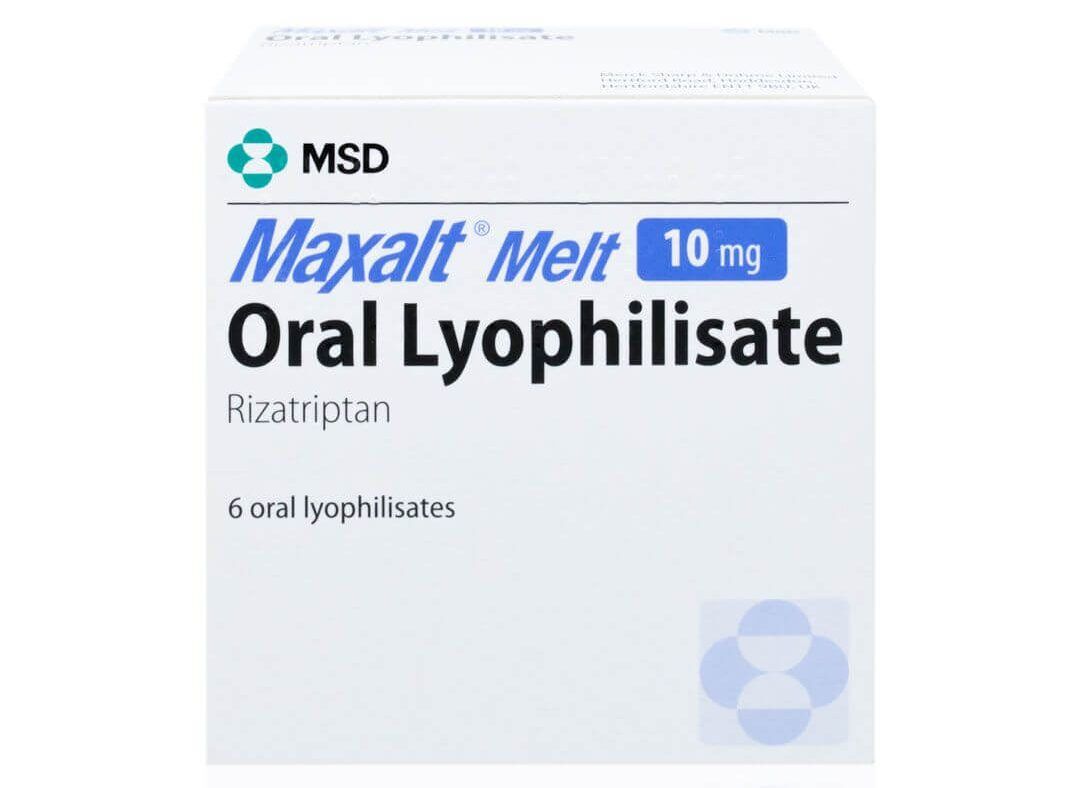Maxalt (Rizatriptan)

Dosages
Maxalt 10 mg
| Quantity | Price per pill | Total price | |
|---|---|---|---|
| 32 | $7.19 | $230.00 | |
| 48 | $6.98 | $335.00 |
Payment & Shipping
Your order is securely packed and usually ships within 24 hours. Below is what a standard package looks like.
It is about the size of a regular letter (9.4x4.3x0.3 inches) and shows no details about what is inside.



| Shipping Method | Estimated delivery |
|---|---|
| Express Free for orders over $300.00 | Estimated delivery to the U.S.: 4-7 days |
| Standard Free for orders over $200.00 | Estimated delivery to the U.S.: 14-21 days |









Discount Coupons
- Independence Day - July 4, 2026 10% JULY410
- Labor Day - September 7, 2026 7% LABOR07
- Thanksgiving - November 26, 2026 9% THANKS09
Brand Names
| Country | Brand Names |
|---|---|
 Greece Greece | Modinol |
 Italy Italy | Rizaliv |
 Netherlands Netherlands | Rizatan |
 Portugal Portugal | Migrof |
| Manufacturer | Brand Names |
|---|---|
| Cipla Limited | Rizact |
FAQ
Description
A survey indicates that 14% of adults worldwide report having severe headaches, while between 50% and 75% of adults worldwide suffer from migraines. Adults experiencing a migraine attack are treated with Maxalt throughout the headache phase. As a selective serotonin 5-HT1B/1D receptor agonist, Maxalt is a member of the medication class.
Following Maxalt treatment, the brain's surrounding blood vessels swell less. This swelling causes the agony of a migraine attack.

Warning Information
Do not take Maxal in the following situations:
- if you have an allergy to rizatriptan benzoate or any other ingredients in this medication;
- you have or have ever had heart issues, such as a heart attack, chest discomfort (angina), or symptoms associated with heart disease;
- you have moderately severe, severe, or slightly increased blood pressure that is not controlled by medicine;
- you suffer from serious issues with your kidneys or liver;
- you have peripheral vascular disease (vascular obstruction) or have experienced a stroke (cerebrovascular accident, or CVA) or minor stroke (transient ischemic attack, or TIA);
- you suffer from peripheral vascular disease;
- you take monoamine oxidase (MAO) inhibitors, such as tranylcypromine, pargyline, moclobemide, or phenelzine (antidepressants);
- if it has been less than two weeks since you stopped taking MAO inhibitors;
- you are currently taking ergotamine-type medications, such as dihydroergotamine, ergotamine, or methysergide to prevent an attack of a migraine;
- you are taking any other medication in the same class, like sumatriptan, naratriptan, or zolmitriptan, for migraine treatment.
If you need clarification on whether any of the aforementioned apply to you, speak with your doctor or pharmacist before taking Maxalt.
Safety Measures
Before using Maxalt, see your physician or pharmacist if;
- you have any of the following heart disease risk factors: high blood pressure, diabetes, smoking or taking nicotine replacement therapy, a family history of heart disease, being a man over 40, or being a postmenopausal woman;
- you use herbal preparations containing St. John's wort;
- you have kidney or liver problems;
- you have a specific heart rhythm issue (bundle branch block);
- you have allergies;
- your headache is accompanied by lightheadedness, gait problems, a lack of coordination, or weakness in your arms and legs;
- when you are using selective serotonin reuptake inhibitors (SSRIs), such as sertraline, if you have experienced an allergic reaction characterized by swelling of the face, lips, tongue, and/or throat, which may cause trouble breathing and/or swallowing (angioedema).
Interactions
Do not start treatment with Maxalt:
- If you are currently using a 5-HT1B/1D agonist, sometimes known as a "triptan," such as sumatriptan, naratriptan, or zolmitriptan.
- If it has been less than two weeks since you stopped using a monoamine oxidase (MAO) inhibitor, such as moclobemide, phenelzine, tranylcypromine, linezolid, or pargyline.
- If you treat your migraines with ergotamine-type drugs, such as ergotamine or dihydroergotamine.
- In the case that you use methysergide to stop migraine attacks.
Maxalt with Meals and Beverages
If Maxalt is taken after eating, it may take longer to start working. You can take it after eating, though taking it on an empty stomach is preferable.
Being Pregnant and Nursing
Before taking this medication, see your doctor or pharmacist if you are expecting a child, are currently nursing a baby, believe you may be pregnant or are thinking about getting pregnant.
Whether taking Maxalt while pregnant poses a risk to the fetus is unknown, after therapy, breastfeeding should be stopped for twenty-four hours.
Children and Senior Patients
It is not advised for children under the age of eighteen to take Maxalt tablets.
No comprehensive studies have examined the safety and efficacy of Maxalt in people over the age of 65.
Using Machinery
If you take Maxalt, you may feel drowsy or faint. If this occurs, avoid operating machinery or tools.
Lactose Monohydrate
There is lactose monohydrate in Maxalt. The lactose monohydrate content of the 5-mg and 10-mg tablets, respectively, is 30.25 mg and 60.50 mg. If your doctor has informed you that you have a sugar sensitivity, speak with them before using this medication.

How to Take
Migraine attacks are treated with Maxalt. Take the pill as soon as you feel the beginning of a migraine headache. Never use it to stop an attack.
Typically, 10 milligrams is the dosage.
Certain people may experience a 24-hour recurrence of migraine symptoms. If you feel a migraine does come back, you can take one more Maxalt dose. Between dosages, you should always wait at least two hours.
You should take no more than two doses of Maxalt in a 24-hour period, including no more than two oral lyophilisate or 10 mg or 5 mg tablets. Between dosages, you should always wait at least two hours. If things get worse, get help from a doctor.
If you take more Maxalt than recommended, consult your physician or pharmacist as soon as possible. Bring the medication pack along.
Overdosage symptoms can include sluggish heart rate, vomiting, dizziness, and sleepiness.
Adverse Effect
Common symptoms affecting 1 to 10 users out of 100 include:
- tingling (paraesthesia), headaches, hypoaesthesia, impaired mental acuity, and insomnia;
- palpitations, or an erratic or rapid heartbeat;
- flushing, or transient redness in the face;
- sore throat;
- experiencing nausea, vomiting, diarrhea, dry mouth, and dyspepsia, or indigestion;
- stiffness, neck pain, and a sensation of heaviness in some body areas;
- chest or abdominal ache.
Rare (affects 1-10 users out of 1000):
- an unpleasant aftertaste;
- vertigo, blurred vision, tremor, ataxia (unsteadiness when walking), and syncope (fainting);
- uncertainty and trepidation;
- hypertension, or elevated blood pressure; perspiration, hot flashes, and thirst;
- redness, itching, and lumpy rash (hives); facial, lip, tongue, and/or throat swelling that might result in trouble swallowing or breathing (angioedema);
- muscle weakness and tightness in certain areas of the body;
- arrhythmias, or irregularities in the rhythm or pace of a heartbeat; rapid abnormalities on an electrocardiogram, a test that monitors the electrical activity of the heart;
- tachycardia in the heartbeat, facial pain, and muscle pain.
How to Keep It
Keep children away from this medication and out of their reach.
It is not advised to use this medication after the "EXP" (expiration date) printed on the box. The expiration date is the last day of the month. Maxalt should not be kept over 30C.



















